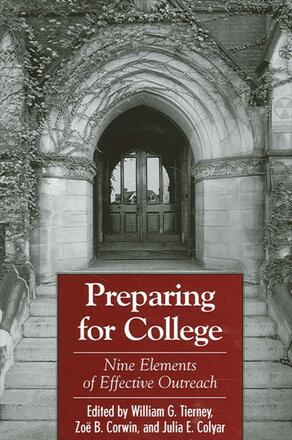
Preparing for College
Nine Elements of Effective Outreach
Alternative formats available from:
Analyzes and defines the parameters of effective college outreach programs.
Description
The remarkable diversity in college preparation programs raises a compelling question: With a finite amount of time and resources, which activities are most likely to improve educational achievement for underrepresented youth in the United States? This book defines and analyzes the parameters of effective college outreach programs. Instead of looking at college preparation writ large, contributors focus on various program components, examining how elements such as academic preparation, culture, family, and mentoring operate within the context of preparation programs and how each contributes—or does not contribute—to program success. By engaging with individual program elements, the contributors provide a means for studying, evaluating, and improving them.
At the Center for Higher Education Policy Analysis at the University of Southern California, William G. Tierney is Director and the Wilbur-Kieffer Professor of Higher Education, Zoë B. Corwin is Research Assistant, and Julia E. Colyar is Postdoctoral Research Associate. Tierney has written many books, including Increasing Access to College: Extending Possibilities for All Students (coedited with Linda Serra Hagedorn), also published by SUNY Press.
Reviews
"This volume covers most of the major topics that the organizers of effective postsecondary encouragement programs should consider as they develop a comprehensive set of support services for low-income and first-generation students. The authors do an effective job of synthesizing relevant literature and providing practical suggestions regarding the implications of the research for providing support for students and their families … One of the strengths of this book is that it helps practitioners determine how to spend their most precious resources, time and money, as they work to support students." — The Journal of Higher Education
"The book is well written and addresses questions of interest for those designing and/or studying college preparatory programs." — CHOICE
"Limitations in educational funding make measurable outcomes even more critical for outreach programs. The authors' arguments for programs that are based on sound theoretical arguments and effective program outcomes will not go unheeded. This is a valuable text for administrators, counselors, researchers, and faculty members who study or participate in programs to improve the achievement of underrepresented youths." — Ken Kempner, coeditor of The Social Role of Higher Education: Comparative Perspectives